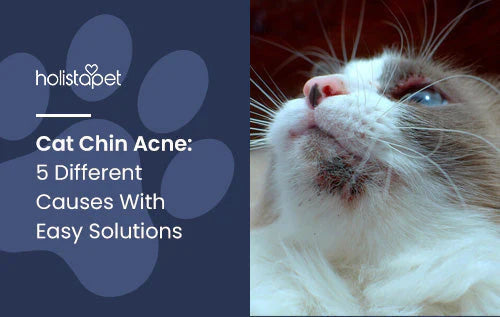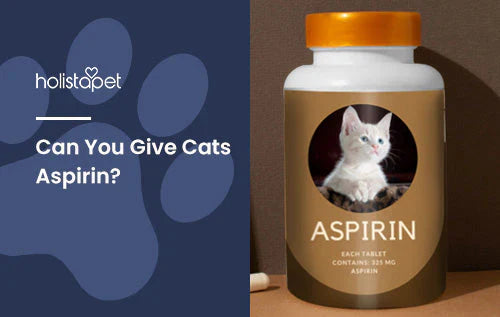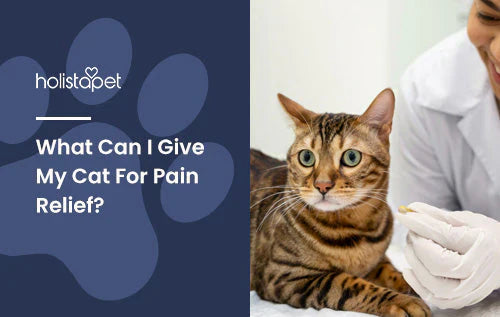Feline chin acne is surprisingly common — your cat might have it and you just haven't noticed! Just like us, cats can get dry or oily skin. And just like us, they may suffer from acne. Acne in cats often share the same causes as human acne, and the same solutions may cure it. The first step to curing cat acne is identifying it. Then, you must first figure out what caused your cat acne chin. We have all the information you need to not only recognize acne but cure it with help from a vet and some at-home remedies.
What Is Cat Chin Acne?
Acne is a condition that presents as blackheads and pimples on the surface of the skin. In felines, acne is commonly found on their chin. Like us, cats can get acne when the hair follicles and skin folds around their oil-producing sebaceous glands become clogged. When sebaceous glands over-produce sebum, the hair follicles become blocked, and that area of the skin becomes oily.
Blackheads form when extra keratin (a type of protein that makes up your skin) gets trapped in the hair follicles. Pimples appear when bacteria infect the hair follicle of those blackheads. This process is similar to how acne develops in people. Not much is known about feline chin acne. While we understand what causes feline acne, we don't know precisely why keratin is over-produced in the first place.
Are Certain Cats Prone to Chin Acne?
While all cats can develop chin acne, certain factors make some felines more prone to this condition than others. Cats that do not groom properly are particularly vulnerable, as poor grooming habits can lead to clogged hair follicles and the accumulation of excess oils and debris on the cat's chin, creating an ideal environment for acne to develop.
Additionally, cats with allergies are more likely to experience feline acne, as allergic reactions can inflame the skin, contributing to the formation of acne on the chin. Specific cat breeds also show a higher propensity for cat acne due to their unique fur types and skin characteristics. Hairless cats, such as the Sphynx, and breeds with curly or wiry fur, like the Devon Rex, are more susceptible to this skin condition.
The absence of fur in hairless cats results in very oily skin because there is no protective coat to absorb excess oil or block dirt from penetrating the skin's outer layer. Consequently, these cats often have "greasy" skin, which can easily lead to the development of acne. Breeds with fur mutations, such as the Peterbald, share this predisposition due to their atypical skin structure, which makes it more challenging to maintain optimal skin health, increasing the likelihood of acne formation.

What Causes Cat Acne?
There are many different reasons why cats get acne — most of the reasons are the same reasons why we get it! It's important to bring your cat to the vet to determine why they are getting acne. This helps you and your vet work out an effective treatment plan and prevents pimples in the future.
- Poor Grooming Habits: Cats who aren't grooming themselves frequently or thoroughly will develop acne more often than cats who wash often. Just like when we don't wash our faces, infrequent grooming will result in a buildup of excess oils.
- Reduced Immune Response: Stress may suppress your cat's immune system. A low immune system means they can't fight off bacteria and infection easily, which may lead to breakouts on their chin and body.
- Hormonal Imbalance: Stress can also sometimes lead to a hormonal imbalance. If your cat's androgen hormone levels increase, their sebaceous glands will over-produce oil, which spells a recipe for pimples.
- Dietary Intolerances: Many cats are notoriously picky eaters. But it's not always about being stubborn. Several cat foods are unhealthy, leading to obesity and allergies. These allergies may result in bad reactions and topical irritations, which ultimately lead to acne. If you notice your cat getting several pimples, you may want to talk to your veterinarian about possible food allergies or sensitivities.
Feline Acne Symptoms
In many cases, there's acne on your cat's chin and you aren't even aware. That's because pimples and blackheads may look like a marking or even dirt. Here's what to watch out for:
- Black specks on the chin: This might appear to be dirt, but it can really be blackheads on your cat's chin. See if they are bumpy or if your cat also has other acne symptoms.
- Greasy fur: The fur surrounding the spots might be oily. Cats with a lighter-colored coat might also have a yellow tint on the hair surrounding the acne.
- Swelling: If the region around the black spots is swollen, that can be a severe case of acne.
- Hair loss: Severe feline acne can also lead to hair loss in the affected area. This may be due to overgrooming and issues around the hair follicles.
- Red sores: If you notice an infection, redness, sores, or bleeding, take your cat to the vet immediately. Severe cases of acne that cause a bacterial infection need professional treatment.

Home Remedies For Chin Acne in Cats
If you suspect that your kitty has acne, there are some things you can do from home as a cat acne treatment while you await a vet visit. These potential remedies could help you out in case you want to spare your feline friend from medical procedures:
- Cleaning the Affected Area(s): If you see that your cat is developing acne, you can clean the area with chlorhexidine antibacterial washes. Contact a vet to learn more about this treatment. You will usually use this wash twice a day, followed by aloe vera to make sure their skin is soothed after the treatment.
- Soothe with Warm Compresses: Bad cases of acne will be accompanied by redness and swelling. Apply a warm water compress to the inflamed pimples to help your cat heal. The humid moisture helps draw out trapped material from the infected lesions and relieves pain.
- Replace Plastic Food and Water Dishes: It's still not completely proven, but research is pointing towards plastic bowls as a possible cause of mild feline acne cases. Some experts believe that the plastic material is a common allergen for many cats, and also a breeding ground for bacteria. Since your cat's face comes into contact with the plastic at every mealtime, it may irritate their face and trigger breakouts. Replace plastic food bowls with stainless steel or ceramic water bowls to see if your cat's acne improves (or doesn't come back after treatment).
- Implementing Fatty Acids: Omega-3 fatty acid is great for your cat's skin. It may help keep their oil production balanced and reduce irritation, meaning acne breakouts wouldn't be as common. Omega-3 fatty acid is a great addition to your cat's skin for other reasons as well, including a reduction in inflammation and treatment of dry skin.
- Try CBD: HolistaPet's CBD oil for cats is very rich in omega-3 fatty acid. This has a calming and soothing effect on your cat, much like how CBD salves and lotions can comfort us in the region it's applied. HolistaPet's CBD cat treats have salmon oil, which is also great for your cat's skin! There's bound to be a CBD product that not only improves your cat's well-being but that they find enjoyable and delicious!

Medical Treatments for Cat Acne on Chin
While the above remedies can definitely improve your cat's acne situation, you'll want to contact a veterinarian for ongoing treatments to completely eliminate the condition. The vet may use multiple therapies and topical treatments to treat the problem. These include:
- Systemic Antibiotics: The veterinarian may put your cat on oral antibiotics to treat their acne infection. Another effective drug is isotretinoin, which shrinks your cat's oil glands and decreases their sebum production.
- Topical Antibiotics: Medicated topicals that kill acne-causing bacteria are also excellent for getting rid of zits. Benzoyl peroxide, clindamycin gel, and mupirocin ointment are all common antibiotics for feline acne.
- Prescription Cleansers: Prescription cleansers, including antibacterial and antifungal shampoos, are often recommended for treating feline acne. These specialized shampoos help to reduce the presence of bacteria and fungi on the cat's skin, which can be contributing factors to the development and worsening of acne.
- Oral or Injectable Antibiotics: These target inflammation for severely affected cats. When your cat receives a steroid shot, it reduces the swelling in the inflamed skin lesion and allows the body to heal it quicker.
- Retinoids: Retinoids are topical products that speed up skin cell production and shedding. Accelerating these processes reduces oil levels and the chance of material getting trapped in the skin. A vet may prescribe this solution to your cat.
Can Cat Acne Be Prevented?
You can definitely prevent cat acne from returning in the future. The first thing most cat owners do is remove plastic dishes. Many cats have a sensitivity to plastic. Help your cat with grooming. If your cat is not great at cleaning themselves, use vet-approved wipes to help them out so acne doesn't return.
You should also figure out why your cat might be stressed. This can prevent acne from returning. Cats are most often stressed due to new situations, new schedules, or new places. Cats are creatures of habit and don't like when their daily routine is disrupted. Has anything changed recently?

- New cat or pet in the home
- More or different work hours
- Change in food
- A recent move
- A new family member or housemate
- A change in layout
- A change in your daily routine
- A new litterbox
Use CBD to soothe your cat during these changes. Simultaneously try to create a new routine that will give your cat comfort. Feed them at the same time every day. Play with them at the same time every day. Provide them with their own areas of the home, including cat trees and cat shelves.
Final Thoughts
You noticed black spots on your cat's chin and realized it's acne. Don't panic! The first thing to do is to figure out how your cat got cat acne. Allergic to plastic? Not cleaning very well? Once you identify the source of their acne, you can not only cure it with the help of a vet but prevent cat acne from returning. Your cat will have healthy skin in no time!







![Probiotics For Dogs [Soft Chews] - HolistaPet](http://www.holistapet.com/cdn/shop/files/Probiotic-Infographic-1_472d7a29-e30c-435a-9638-1365d8c3a9f9.jpg?v=1725384841&width=104)



























Leave a comment
All comments are moderated before being published.
This site is protected by hCaptcha and the hCaptcha Privacy Policy and Terms of Service apply.